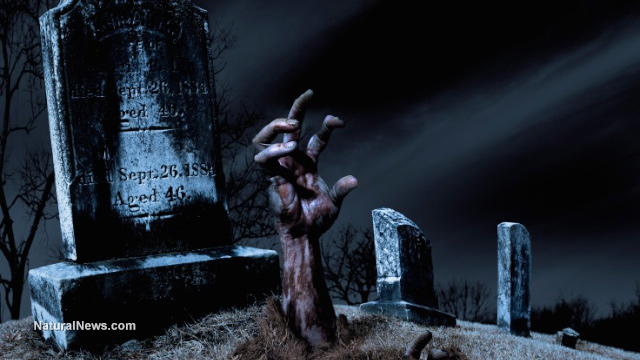 You never know when the zombie apocalypse might strike, so it’s a good thing that the Pentagon is training military nurses how to respond in such a situation.
You never know when the zombie apocalypse might strike, so it’s a good thing that the Pentagon is training military nurses how to respond in such a situation.
At the Uniformed Services University of the Healthcare Sciences, military nursing students are required to take a population health course to earn a family nurse practitioner doctorate. The online population health course in this program has students working through a number of creative scenarios, one of which is a zombie pandemic.
In the imaginary scenario, students must use their knowledge to quarantine people,administer vaccines and make use of international resources in accordance with actual Department of Defense guidelines. The DoD says that the program serves as a creative way to keep students engaged and make the material more memorable.
In the course, students are shown video clips outlining different zombie apocalypse scenarios. In one, a fictitious president delivers a “State of the Zombie Pandemic” address, while others show the impact that the zombie virus has had on the imaginary population, right down to realistic anti-zombie posters strewn about the streets.
While some people might find the idea of training nurses to administer vaccines on a wide-scale unsettling, educators believe it’s a crucial skill right now.
Catherine Ling, assistant professor and family nurse practitioner for the PhD and DNP programs at USU’s Daniel K. Inouye Graduate School of Nursing, says that the global increase in antibiotic resistance is one reason this skill is necessary. She also points topandemics like Zika and Ebola as examples of situations for which this type of training is useful.
Ling says that the course allows students to use “the other side of their brain,” fostering critical thinking and problem-solving skills, while allowing them to think creatively.
Students react positively to program
The program seems to be well-received by students. Air Force Captain Marcie Hart, who also considers herself a fan of The Walking Dead, told the Daily Mail that she felt the videos had been done tastefully, and that it was a fun and wonderful twist to the course.
She added that the “infected” could be cured later on in the scenario, which made it less violent than it might sound.
Using this type of fictional scenario for training is not a new concept. For example, Natural News reported in 2012 that a counter-terrorism program attended by 1,000 participants from military, law enforcement and medicine, would use a zombie apocalypse scenario for training. The idea was to challenge authorities as they responded to real-world conditions where people could become crazed and violent. Zombies also feature in a comic book produced by the CDC.
Even if zombies don’t come, being prepared is still vital
While a zombie apocalypse seems pretty unlikely, other scenarios have a disturbingly reasonable chance of one day occurring, such as a solar flare or EMP attack. These fictional zombie scenarios underscore just how important it is for people to be prepared for pandemics, natural disasters and other emergencies. Right now, we are living in dangerous times, where civil unrest and social chaos are very real possibilities, and you can never rule out natural disasters.
Building up a supply of storable food is one of the most basic steps of preparedness that you can take. However, it’s not quite as easy as just filling up your cabinet with canned goods. You’ll want to find foods that are free of chemicals and GMOs, like the Health Ranger Organic Emergency Survival Food Buckets. The best choices for survival food will contain real nutrients in the form of whole foods to ensure you get plenty of protein, fiber and minerals. After all, you’ll need to be strong, alert and healthy to fight off those zombies! SOURCE